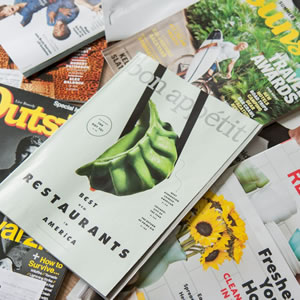Welcome to another installment of Ask The Editor!
This month a travel blogger I know personally called and asked me why he/she (I won’t say which, I’m trying to keep this anonymous since it involves some constructive criticism) has been declined by several PR companies and destinations for press trips.
It was frustrating just being ignored by the decision-makers, but when they started proactively asking to be included on press trips, getting declined was enough to make him/her consult me.
Q. I’ve been a travel blogger for a couple of years and still can’t seem to get invited on press trips – what gives?
A. Oh dear. I’ll be as gentle as I can be, because I really enjoy reading your blog, but with even a quick glance it’s easy to see why you’re not getting the free trip invites.
How can I put this…..your blog is…umm…vulgar? Yes, vulgar. You sprinkle your posts with curse-words like they were jimmies on an ice-cream cone. You use them as verbs, adjectives, adverbs, perjoratives, and sometimes as punctuation.
That tends to be a huge turn-off to potential press trip sponsors (tourism boards, CVBs, hotel and resort chains), professional PR companies, and potential advertisers. Really huge.
Most destinations don’t want the F-word anywhere near a mention of their property.
Most professionals in the business of promoting Travel find it offensive and will run away – fast – from connecting their clients with your blog, worried NOT that you’d write a negative review (honest reviews accompanied by the opportunity for a property manager to respond are always respected) BUT that you’ll write an expletive filled rant about how “effing horrible” a place was because they wouldn’t give you unlimited free booze.
Oh yes, the booze-filled rants. There’s that too. Did you realize that most of your blog posts are about your wild escapades and partying habits? Sure, they’re about a place that you visited, and yes that makes you a travel blogger, but they’re about the crazy-alchohol-induced-fun time you had with your friends, not about what other visitors to that place might be interested in.
Yeah, I know – your friends love it and think you’re a hoot! I do too, really….I laugh at every one of your posts! But this isn’t about adoring you, it’s about answering your question honestly.
And I know you said you’re just “keeping it real”, and no doubt it is real for you. But what’s ‘real’ for you isn’t necessarily ‘real’ for the majority of the traveling public. And it’s also why you don’t get invited on press trips.
SO you just need to decide what your goal is.
Do you want your family, friends, and a small circle of other travel bloggers to love your wild tales of your free-spirited adventures?
If so, just re-label yourself as a humor blogger and carry on. You may not get press trips, but there are loads of highly successful humor blogs out there that use language that would make even YOU blush – a great example is The Bloggess (whom I also adore) – embrace the style and go with it!
Or do you want to be take seriously as someone who promotes travel, who will be appealing to travel industry PR firms, advertisers, and trip sponsors?
If that’s what you want, clean up your writing a bit (including your spelling and grammar!) and focus on blogging about travel, not blogging about you.
Either way I’ll still read (and love) your blog, honestly.
~ Trisha
How do you feel about expletive-laced posts? Share your opinion!






Hi Trisha!
Hmm, interesting situation. As a PR consultant, I don’t think expletives alone would rule out the individual for a press trip, but if, as you say, it is all about themselves and their “booze-filled rants”, then more than likely we would decline. It all goes back to who their audience is and how engaged that audience is. The best way we can tell that is by the comments section and a twitter feed if applicable.
Our bottom line is to find bloggers who will inspire their readers to take action on behalf of our clients.
Funny thing, I have been working on a guest post for you this weekend about why we turned down a writer last week. I’ll finish it up and send it to you!!!
Lisa
I totally agree that it really boils down to audience demographics and engagement, and how a blogger’s influence can help a client achieve positive results.
So if a blogger writes about their fabulous, booze-filled, effen awesome vacation at XYZ resort, and it sends measurable business to XYZ resort, then the client *should* be willing to overlook the expletives….but as we know that can take some doing to convince some clients of that.
Thanks for your input! AND I will look forward to another guest post from you – I think your perspective is extremely valuable to travel bloggers!
You’re so smart, Trisha, and right on the money here. I remember just over a year ago, talking with someone with the same complaint, and this writer was similar in linguistic style (fancy!) as the person you talked with.
I do understand the complexity, though, for someone who enjoys dropping the f-bomb let and right. All the online social media talk about authenticity is valid, but someone who writes like a truck driver will have to either lose their valued authenticity, or not be welcomed by CVBs quite the same way as those of us who moderate our language.
.-= Jennifer´s last blog post: Three Best Restaurants in Honolulu- Hawaii =-.
Hi Jen – another good point. I do believe that writers and bloggers must be authentic if they want to build credibility and respect, and I realize that many people today speak using expletives without giving it much thought.
I think if a blogger’s audience is primarily truck drivers, and he/she writes reviews of truck stops large and small, it could be entirely appropriate to say “that was the best effen potato salad I’ve ever had” and readers might agree “hell yeah, effen right!”…and in that situation I can’t image the client (truck stop) complaining. Authenticity sometimes (okay maybe even frequently) trumps language.
But as you’ve said, CVBs rarely welcome such potentially embarrassing ‘press’ so if the goal is to be invited on press trips (to somewhere other than a truck stop), then the blogger should try to find a good balance between authenticity and vulgarity.
Hi, Trisha! As a freelance travel writer and a reader of travel stories, I do feel that offensive language is a total turn-off when reading articles. Very rarely can such words add to the image the writer is (should be) conveying about his/her travel experience. Rather, in most cases, they appear to be a tool by the writer to (a) enhance his/her writing style, (b) an effort to make him/her appear more “real,” and/or (c) express how he/she talks in regular life. However, as pointed out above, the writer needs to write in a way that appeals to his/her audience without sacrificing his/her natural voice. I’ve never seen a case where leaving out offensive language had a negative impact on a writer’s natural voice.
.-= Karon Warren´s last blog post: Myrtle Beach- South Carolina – The Perfect Year-Round Destination =-.
Hi Karon – I do agree with you when the focus is a travel story, even a narrative essay, and I think that when some sort of expletive-style emphasis is needed (in an essay maybe?), there are plenty of non-offensive words to choose from.
However, that being said, I do also think that there is an audience out there for expletive-filled humorous rants (or even non-humorous rants) but that such writing is rarely compatible with what travel consumers (the demographic that press trip sponsors are looking to reach) are seeking.
I’m just trying to picture the press trip to the truck stop. Might be interesting:)
I agree – I can already imagine my packing list: 2 John Deere caps, 4 plaid-flannel shirts w/arms cut off, various sports-themed t-shirts, 6 rolls of antacids, and a belt-loop chain for my wallet. Hmm….that should do it.
Great post Trisha. I like how you weren’t suggesting she/he change her/his voice but to fully embrace what she/he is and go for it.
.-= Carlo Alcos´s last blog post: The Fall Colours in Nelson PHOTOS =-.
Thanks Carlo! I sincerely believe that there is a place online for all types of humor, including the expletive-filled variety. If folks don’t like it, they don’t have to read it, but there are plenty of people who do laugh out loud and appreciate it. And I think bloggers should be free to be authentically themselves, whatever that is, as long as it doesn’t conflict with their own goals. If it does, then they just need to either reassess their goals, or their voice, or find a balance.
Thanks for stopping by!
Hi!
I have a question. I’m a newbie in travel writing and I’d really like the opportunity of being invited on press trips, so I’m glad I got to read this article. Is it better if the travel blog is kept long and informative or short but meaningful?
How about in terms of reviewing a hotel or a place, is it safer to exclude negative opinions?
.-= Brenna´s last blog post: Puerto Princesa City =-.
Hi Brenna – good questions!
There are many ‘styles’ of travel blogs, the two most common being: 1) A narrative, personal experience accounting of trips, which can be any length as they are primarily intended to entertain readers who travel vicariously through those stories; and 2) A ‘review’ style that is typically kept factual and is only as long as it needs to be, since the intention is to inform travel consumers who make decisions based on those reviews.
I do think that the two can overlap successfully, with a review being highly personalized, yet not bogged down in minutiae, but I strongly advise all travel writers and bloggers to be honest, and sometimes that means sharing negative opinions. However, I do believe that when there are problems, the best course of action is to speak to a property manager or someone in charge to give them the opportunity to resolve a situation before writing about it.
Problems are common when traveling, so a perfect review can seem suspect, but I always have a favorable opinion of a place that works to correct problems and ensure they don’t happen again.
I’d love to see the blog you’re talking about here, and know whether the writer is widely published outside of his/ her blog. But let’s look at it from another perspective – what on earth is someone whose ouevre is keeping it real, partying and getting sweary seeking out press trips for anyway? The whole press trip experience doesn’t seem to fit with the content or audience. It’s like someone who specialises in death metal trying to get free tickets for Britney concerts.
For the PR people, it’s usually a simple case of return on investment. If they reckon it’s worthwhile investing in you, they will do. If they don’t they won’t. And in this case, for whatever reason, they don’t.
As for language used in blog posts, I’m probably the last one to get high and mighty about this as I’ve been known to get a bit post-watershed on my own blog. But if you are going to fill up the swear box, there should be good reason for it. Effing for effect and punctuation generally isn’t necessary – and, more often than not, can detract from what you’re saying.
.-= David Whitley´s last blog post: What is ‘good service’ =-.
Excellent point David – it really is a simple ROI equation, although I know PR people who have to work hard to convince a client that the ROI outweighs other factors, such as language.
What I encounter is a lot of bloggers who categorize themselves as “travel bloggers” even though they are really more of an entertainment blog than a travel blog – it’s about their experience, not the destination per se.
But somehow word leaked out that if you’re a ‘travel’ blogger, you suddenly get to go on free trips. I spend a good deal of time educating bloggers on the reality, not the dream.
BTW, I loved your last blog post…It’s often hard to find good service these days!
Ah well, no press trips for me. ;)
You never know, after all your blog is nowhere NEAR as um, “revealing” as the one I wrote about above, and besides you’ve already proven that you can bring business to Newfoundland!
P.S. I love your blog too, even when I can’t think of anything to comment, I still read it. :-)
Well, there goes coverage of Nepal’s Cursing Event.
.-= Zippy Sandler´s last blog post: The Hills are Alive =-.
I have been laughing over this one for days…
Very true!
By the way, it’s re-‘label’ not ‘lable’.
Thank you! Correction made…..even us editors sometimes have an ‘off’ day :-)
Hi Trisha,
This is a great site for travel bloggers to ask questions and learn from others. I also find it refreshing that a PR professional took the time to comment on the topic.
As a pr pro and travel blogger, I can tell you that PR agencies and their clients are still trying to understand bloggers and what they bring to the bottom line. As Lisa and David point out, it is all about ROI.
Keep in mind that press trips are not “free travel” for anyone involved. The client is putting out large dollars to bring the blogger to the destination. The PR consultant is responsible for delivering value to the client and the blogger is working to file as many articles and posts, as possible as a result of the press trip.
.-= Nancy D. Brown´s last blog post: Spring Creek Ranch Winter Horseback Riding Vacation- Jackson Hole- WY =-.
One point I would to pick up on is the writer being part of the story. I am of the thinking that the destination is the story, perhaps I don’t see myself as interesting enough to be the story. Also the booze/pissed up stories get boring, there are only so many times I want to read about how you got mashed up in Thailand and raved all night.
I meet so many travellers who can’t remember any of their travels because they were so drunk, or even worse the ones who head home early because they are out raving all night and run out of money.
Don’t get me wrong, I love a drink as much as the next person and swear like a sailor but I wouldn’t ever dream of incorporating any of that in my travel writing.
You make a very good point Mike – the articles that sell most easily (as well as most assigned articles) are the ones that leave the writer out of the story entirely. Those are also the easiest ones to rewrite and sell to another publication, because you’re not also dealing with trying to change an experience that you’re tied to.
Of course there are some publications that like a narrative, writer-involved style, and even a few that want the lurid tales of wild parties and such…..but generally speaking, to be regularly invited on press trips it’s important to sell many stories about your host destination, which is easier when the stories are tamer and not tied to the writer him/herself.